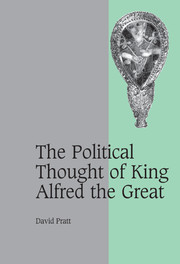Book contents
- Frontmatter
- Contents
- Acknowledgements
- List of abbreviations
- Note on citations
- Chapter 1 INTRODUCTION
- Part I The West Saxon Political Order
- Part II Alfredian Discourse and its Efficacy
- Chapter 7 THE FIELD OF ALFREDIAN KNOWLEDGE
- Chapter 8 THE CONSTRUCTION OF ALFREDIAN DISCOURSE
- Chapter 9 ALFREDIAN TECHNOLOGY: BOOKS AND ÆDIFICIA
- Chapter 10 THE HIERDEBOC AS A TREATISE OF POWER
- Chapter 11 THE DOMBOC AS A REORIENTATION OF ROYAL LAW
- Chapter 12 TRIBULATION AND TRIUMPH IN THE FIRST FIFTY PSALMS
- Chapter 13 THE SEARCH FOR A SATISFACTORY CONSOLATION
- Chapter 14 SEEING GOD AS HE IS
- Chapter 15 CONCLUSION
- Appendix: West Frankish deployment of Solomon's dream
- Bibliography
- Index of manuscripts
- General index
- Cambridge Studies in Medieval Life and Thought Fourth Series
Chapter 10 - THE HIERDEBOC AS A TREATISE OF POWER
Published online by Cambridge University Press: 06 July 2009
- Frontmatter
- Contents
- Acknowledgements
- List of abbreviations
- Note on citations
- Chapter 1 INTRODUCTION
- Part I The West Saxon Political Order
- Part II Alfredian Discourse and its Efficacy
- Chapter 7 THE FIELD OF ALFREDIAN KNOWLEDGE
- Chapter 8 THE CONSTRUCTION OF ALFREDIAN DISCOURSE
- Chapter 9 ALFREDIAN TECHNOLOGY: BOOKS AND ÆDIFICIA
- Chapter 10 THE HIERDEBOC AS A TREATISE OF POWER
- Chapter 11 THE DOMBOC AS A REORIENTATION OF ROYAL LAW
- Chapter 12 TRIBULATION AND TRIUMPH IN THE FIRST FIFTY PSALMS
- Chapter 13 THE SEARCH FOR A SATISFACTORY CONSOLATION
- Chapter 14 SEEING GOD AS HE IS
- Chapter 15 CONCLUSION
- Appendix: West Frankish deployment of Solomon's dream
- Bibliography
- Index of manuscripts
- General index
- Cambridge Studies in Medieval Life and Thought Fourth Series
Summary
The centrality of Gregorian language within Alfredian discourse highlights the Hierdeboc's significance as a guiding means of ‘re-education’. Enhanced in translation, Gregory's open-ended treatment of authority informed fundamental assumptions about the role of power. Though directed to episcopal readers, the text's implications extended more widely to present and future participants in power. Gregorian language received further force from its impact on other royal translations. Through reception and wider implementation, the Hierdeboc supplied an overarching treatise of contemporary power.
The act of translation must be situated in this context. The fidelity of the king's version, closer to its source than any other royal text, cannot mask its contemporary significance. Royal translation was a gesture of appropriation, mirroring the new relationship between Southumbrian bishops and West Saxon king. Alfred's status as translator simultaneously reinforced the need for full secular participation. The closeness of translatory treatment reflected not only the directness of Gregory's rhetoric, but his authoritative Southumbrian memory. Yet textual reshaping was not confined to outward presentation: translation demanded active engagement with Gregorian thought and language, the more revealing for its focus on rule. The mediation of Gregory was a re-reading through the lens of West Saxon structures, effecting a localized treatment of power.
LANGUAGE AND CONTEXTS
Pope Gregory's deep impact on medieval western Christendom owed much to the character of his pastoral theology.
- Type
- Chapter
- Information
- The Political Thought of King Alfred the Great , pp. 193 - 213Publisher: Cambridge University PressPrint publication year: 2007

